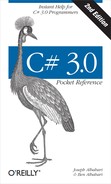To promote encapsulation, a type or type member may limit its accessibility to other types and other assemblies by adding one of five access modifiers to the declaration:
-
public Fully accessible. The implicit accessibility for members of an enum or interface.
-
internal Accessible only within containing assembly or friend assemblies. The default accessibility for nonnested types.
-
private Visible only within containing type. The default accessibility members of a class or struct.
-
protected -
protected internal The union of
protectedandinternalaccessibility. (This is less restrictive thanprotectedorinternalalone.)
Note
The CLR has the concept of the intersection of protected and internal accessibility, but C# does not support this.
Class2 is accessible from outside its assembly;
Class1 is not:
class Class1 { } // Class1 is internal (default)
public class Class2 { }ClassB exposes field x to other types in the same assembly; ClassA does not:
class ClassA { int x; } // x is private
// (default)
class ClassB { internal int x; }Functions within Subclass can call Bar but not Foo:
class BaseClass
{
void Foo() { } // Foo is private (default)
protected void Bar() { }
}
class Subclass : BaseClass
{
void Test1() { Foo(); } // Error: cannot access Foo
void Test2() { Bar(); } // OK
}A type caps the accessibility of its declared members. The most common example of
capping is when you have an internal type with public members. For example:
class C { public void Foo() {} }C’s (default) internal accessibility caps Foo's accessibility, effectively making Foo internal. The reason Foo would be marked public is to make for
easier refactoring, should C later be changed to
public.
When overriding a base class function, accessibility must be identical on the overridden function.
The compiler also prevents any inconsistent use of access modifiers. For example, a subclass itself can be less accessible than a base class, but not more accessible:
internalclass A { }publicclass B : A { } // Error
